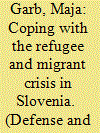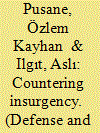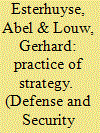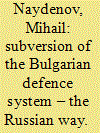|
|
|
Sort Order |
|
|
|
Items / Page
|
|
|
|
|
|
|
| Srl | Item |
| 1 |
ID:
160991


|
|
|
|
|
| Summary/Abstract |
Approximately 470,000 refugees and migrants passed through Slovenian territory between September 2015 and March 2016, creating a crisis that required a great deal of organisational and field work on the part of many governmental and non-governmental institutions. In the social sciences, a discourse on “security versus humanitarian approach” on the refugees and migrant issue appeared; however, the article goes over such a discourse and deals with roles and problems of different institutions – mostly the military – that responded to the crisis. Namely, coping with the crisis was characterised by significant institutional adjustments, difficult co-ordination, and intense public debate. The Slovenian Armed Forces were included in this process as support for Civil Protection and Police. The military’s role followed the military missions defined by the Defence Act; however, the government also proposed some changes to the act that were met with some doubts on the part of the public and different institutions.
|
|
|
|
|
|
|
|
|
|
|
|
|
|
|
|
| 2 |
ID:
160993


|
|
|
|
|
| Summary/Abstract |
Insurgents often develop international connections and benefit from external assistance from a variety of sources. Support from diaspora communities has long been considered one of the critical external factors in the persistence of insurgent groups. Yet how the counterinsurgent state addresses external support from transnational ethnic communities and what factors influence the state's policies remain understudied. By focusing on the transnational political practices of the Kurdish community and the PKK in Western Europe, this paper examines how Turkey has addressed the diasporic support for the PKK since the 1980s. It shows that three major factors – the composition of foreign policy decision-makers, their ideological contestation over the Kurdish question, and the European political context – have affected Turkey's policy regarding the PKK's transnational dynamics in Europe.
|
|
|
|
|
|
|
|
|
|
|
|
|
|
|
|
| 3 |
ID:
160992


|
|
|
|
|
| Summary/Abstract |
As a result of the migration crisis of 2015–2016, the management of mass migration and border control became militarised in Central Europe, and this process has also reshaped the dynamics of multinational defence cooperation in the region. Accordingly, while the so-called Central European Defence Cooperation (CEDC) was created by Austria, Croatia, the Czech Republic, Hungary, Slovakia and Slovenia in 2010 to support NATO and EU capability development projects via defence cooperation, after the migration crisis it became the major Central European forum for military cooperation against irregular mass migration. Although many defence officials in the region are not necessarily enthusiastic about this development, the Central European political environment and also practical defence considerations pushed the defence ministries of CEDC countries towards deeper cooperation on border control, as well as better coordination with ministries of interior affairs on the national and the regional levels.
|
|
|
|
|
|
|
|
|
|
|
|
|
|
|
|
| 4 |
ID:
160994


|
|
|
|
|
| Summary/Abstract |
The article concerns the strategy development processes of the South African Department of Defence in South Africa. It intends to identify the probable causes of the observed failure of the South African National Defence Force to develop appropriate departmental policy and military strategy. Military strategy comprises force development, force employment, force deployment and the coordination of these elements in pursuit of national, grand-strategic objectives. (See Dennis M. Drew and Donald M. Snow, Making Twenty-first Century Strategy: An Introduction to Modern National Security Processes and Problems Montgomery, AL: Air University Press, Maxwell Air Force Base, November 2006, 103). Of these four constructs, the article concerns itself only with the first two. The article analyses two complementary approaches to strategy formation: a resource-driven, inside-out model and an interests-driven, outside-in method. The article concludes that the Department is preoccupied with the inside-out method to the lasting detriment of the declared strategic intent of the defence policy.
|
|
|
|
|
|
|
|
|
|
|
|
|
|
|
|
| 5 |
ID:
160995


|
|
|
|
|
| Summary/Abstract |
Using two recently published essays by the current writer that assesses the dismal record of performance of Planning, Programming, and Budgeting System in enabling communist legacy defence institutions in Central and Eastern Europe to develop viable defence plans, this essay argues the need for deep reforms in the region’s defence institutions. To guide this reform effort, pragmatic solutions are suggested to improve the ability of these organisations to produce viable defence plans. Recommended reforms are: (1) conduct conceptual and cultural “audits,” (2) make operational and financial data central to decision-making, (3) change current organisational sociology, (4) examine planning methods and practices, and (5) stress the need to adopt policy frameworks to drive the operation of defence institutions.
|
|
|
|
|
|
|
|
|
|
|
|
|
|
|
|
| 6 |
ID:
160996


|
|
|
|
|
| Summary/Abstract |
Russia has long been pursuing an intended and calculated policy of keeping enough influence in Bulgaria in order to have control over national decisions. Together with the economic, energy, political and information tools used by Russia in its hybrid war against Bulgaria and in its bid to achieve an enduring “state capture,” defence is also a distinct target of Russian subversion now. A list of noticeable subversive actions with tangible effects can be summarised, ranging from fuelling division and manipulating public opinion, preventing the strengthening of the NATO position in the Black Sea, sabotaging defence reform to various options of subverting the modernisation of the Bulgarian Armed Forces and seeking new ways to keep legacy Soviet military equipment in operation as long as possible. This issue must be urgently addressed both nationally and in NATO.
|
|
|
|
|
|
|
|
|
|
|
|
|
|
|
|
|
|
|
|
|